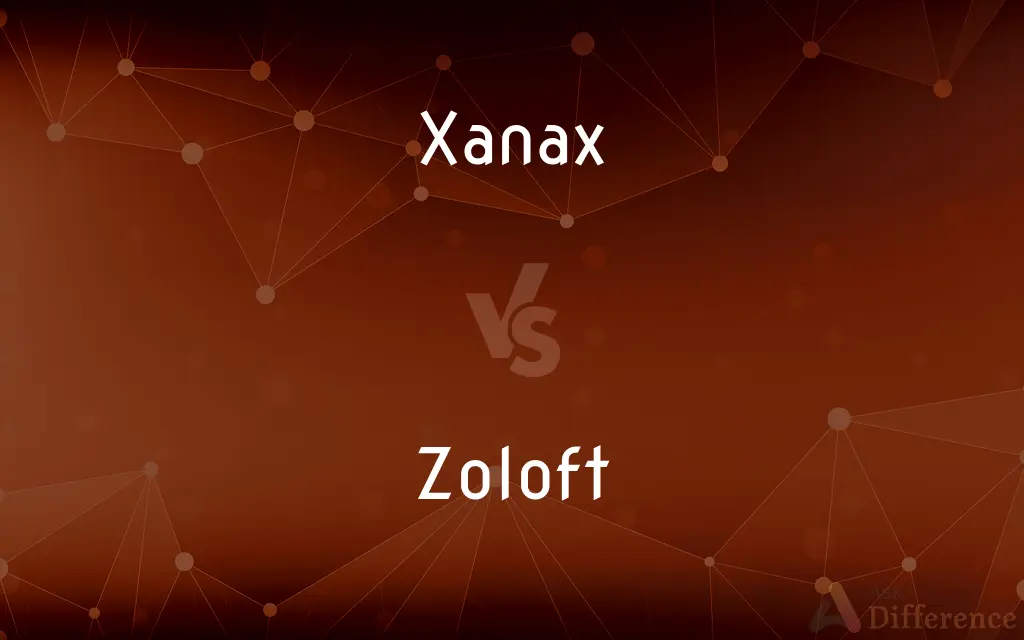Xanax vs. Zoloft — What's the Difference?
By Fiza Rafique & Maham Liaqat — Updated on March 9, 2024
Xanax is primarily used for anxiety and panic disorders, while Zoloft is used for depression and a broader range of mood disorders.

Difference Between Xanax and Zoloft
Table of Contents
ADVERTISEMENT
Key Differences
Xanax, known generically as alprazolam, is a fast-acting benzodiazepine that is commonly prescribed for immediate relief of anxiety symptoms and panic attacks. It works by enhancing the effects of a natural chemical in the body (GABA) to promote calmness. Zoloft, or sertraline, is an SSRI (Selective Serotonin Reuptake Inhibitor) that helps increase the levels of serotonin in the brain, which can improve mood and energy levels.
Due to its rapid action, Xanax is often used for acute anxiety episodes, offering quick relief usually within an hour of ingestion. On the other hand, Zoloft is typically taken daily and may take several weeks to start showing its full effects, as it aims to balance serotonin levels over time.
Xanax is known for its potential for dependence and withdrawal symptoms, making it more suitable for short-term use under careful medical supervision. Zoloft, while it can have side effects, has a lower risk of dependence and is generally considered safe for long-term use in managing mood disorders.
Side effects of Xanax can include drowsiness, confusion, and impaired coordination, which can affect one's ability to perform tasks that require alertness, such as driving. Zoloft's side effects might include nausea, insomnia, and changes in appetite, but these often diminish over time as the body adjusts to the medication.
Both medications should be taken under the guidance of a healthcare provider, with careful consideration of their interactions with other medications and their potential side effects. It's important to discuss the benefits and risks with a doctor to determine the most appropriate treatment for individual needs.
ADVERTISEMENT
Comparison Chart
Classification
Benzodiazepine
Selective Serotonin Reuptake Inhibitor (SSRI)
Primary Use
Anxiety and panic disorders
Depression, anxiety, PTSD, OCD, and other mood disorders
Action Onset
Rapid, often within an hour
Gradual, may take several weeks
Duration of Use
Short-term due to potential for dependence
Generally safe for long-term use
Common Side Effects
Drowsiness, confusion, impaired coordination
Nausea, insomnia, changes in appetite
Compare with Definitions
Xanax
Acts by enhancing the effects of GABA.
Xanax works by promoting calmness in the brain.
Zoloft
Suitable for long-term management of symptoms.
She has been taking Zoloft for years with good results.
Xanax
Not recommended for long-term use due to dependency risks.
He was advised to use Xanax only for acute anxiety episodes.
Zoloft
Works by increasing serotonin levels.
Zoloft improved her mood by balancing serotonin.
Xanax
Used for quick relief of anxiety symptoms.
She took Xanax to calm her panic attack.
Zoloft
Prescribed for a range of mood disorders including depression.
His doctor prescribed Zoloft to help with his depression.
Xanax
Can cause significant drowsiness and impair motor skills.
After taking Xanax, he avoided driving due to drowsiness.
Zoloft
Side effects often diminish as the body adjusts.
Initial nausea from Zoloft subsided after a few weeks.
Xanax
Withdrawal symptoms can be severe if not properly managed.
She experienced withdrawal when abruptly stopping Xanax.
Zoloft
Lower risk of dependency compared to Xanax.
Zoloft was chosen for its lower dependency risk.
Xanax
An antianxiety agent (trade name Xanax) of the benzodiazepine class
Zoloft
A selective-serotonin reuptake inhibitor commonly prescribed as an antidepressant (trade name Zoloft)
Common Curiosities
What are the withdrawal symptoms of Zoloft?
Zoloft withdrawal can include dizziness, nausea, and mood changes, but is generally less severe than Xanax.
Is Xanax effective for depression?
Xanax is not typically used for depression; it's primarily for anxiety and panic disorders.
Is it safe to drive while taking Xanax?
Due to its sedative effects, driving or operating heavy machinery is not recommended on Xanax.
Can Zoloft help with anxiety?
Yes, Zoloft is effective in treating anxiety and related disorders in addition to depression.
How quickly can one feel the effects of Xanax?
Xanax can provide relief within an hour of ingestion for many people.
Can Xanax be used for long-term anxiety management?
Due to its potential for dependency, Xanax is typically not recommended for long-term anxiety treatment.
Are there any natural alternatives to Xanax or Zoloft?
Some may find relief with lifestyle changes, therapy, or natural supplements, but always consult a healthcare provider first.
Can Xanax and Zoloft be taken together?
Co-administration should be done under strict medical supervision due to potential interactions.
What should I do if I miss a dose of Zoloft?
If a dose is missed, take it as soon as remembered unless it's close to the time of the next dose.
What's the best way to discontinue Xanax?
Tapering off under medical guidance is crucial to minimize withdrawal symptoms.
Can Zoloft cause weight gain?
Some individuals may experience weight changes on Zoloft, but it varies by person.
How long does it take for Zoloft to work?
It can take several weeks to notice the full effects of Zoloft.
Can Zoloft affect sleep?
Zoloft can cause sleep disturbances in some individuals, either insomnia or increased sleepiness.
How does Xanax interact with alcohol?
Combining Xanax with alcohol can increase sedative effects and is highly dangerous.
Is Xanax addictive?
Xanax has a high potential for dependency and should be used with caution.
Share Your Discovery

Previous Comparison
Full vs. Fully
Next Comparison
Affirm vs. ReaffirmAuthor Spotlight
Written by
Fiza RafiqueFiza Rafique is a skilled content writer at AskDifference.com, where she meticulously refines and enhances written pieces. Drawing from her vast editorial expertise, Fiza ensures clarity, accuracy, and precision in every article. Passionate about language, she continually seeks to elevate the quality of content for readers worldwide.
Co-written by
Maham Liaqat














































